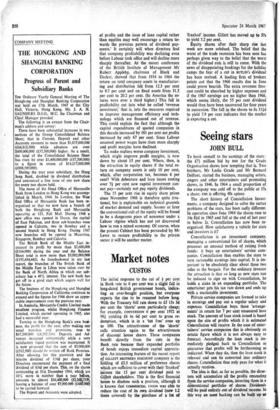Market notes
CUSTOS
The initial response to the cut of # per cent in Bank rate to 6 per cent was a slight fall in long-dated British government bonds, indica- ting an over-bought position, but everyone expects the rise to be resumed before long. With the Treasury bill rate down to £5 13s 3d per cent the 'shorts' seem particularly cheap; for example, CONVERSION 6 per cent 1972 at 98+ yielding £6 6s 6d per cent to gross re- demption, which is in a 'tax free' zone up to 100. The attractiveness of the 'shorts' calls attention again to the attractiveness of discount house shares. These companies benefit directly from the cuts in the Bank rate because their expanded portfolio of bonds enjoys immediate capital apprecia- tion. An interesting feature of the recent report Of GILLETT BROTHERS DISCOUNT company is the holding of £3.3 million of preference shares which are sufficient to cover with their 'franked' income the 15 per cent dividend paid to Gillett shareholders. This is the first financial hoilse to disclose such a position, although it is known that COMMERCIAL UNION was able to reduce the cost of its own dividend (noir, 12 times covered) by the purchase of a lot of `franked' income. Gillett has moved up to 57s to yield 5.2 per cent.
Equity shares after their sharp rise last week are more subdued. The belief that the worst of the trade recession has been seen has perhaps given way to the belief that the worst of the dividend cuts is still to come. With the news of disappointing bookings for the holiday camps the fear of a cut in Burtnst's dividend has been revived. A leading firm of brokers points out that the 1966 results due in June could prove bearish. The extra revenues fore- cast could be absorbed by higher expenses and if the 1967 earnings are no higher than 1966, which seems likely, the 55 per cent dividend would then have been uncovered for four years in succession. The fall in the shares to 6s 11 -d to yield 7.9 per cent indicates that the market is expecting a cut.


































 Previous page
Previous page